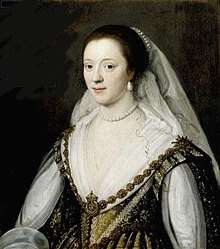John Villiers, 1st Viscount Purbeck
John Villiers (c. 1591 – 18 February 1658)[1] was an English courtier from the Villiers family. The eldest son of Sir George Villiers and Mary Beaumont, later Countess of Buckingham, he was the brother of King James I's favourite, George Villiers, 1st Duke of Buckingham.
John Villiers, 1st Viscount Purbeck | |
|---|---|
| Born | c. 1591 |
| Died | 18 February 1658 Charlton, London, England |
| Spouse(s) | Frances Coke, Viscountess Purbeck |
| Father | Sir George Villiers |
| Mother | Mary Beaumont |
Family
John Villiers, born about 1591, was the eldest son of Sir George Villiers of Brooksby, Leicestershire, and his second wife, Mary Beaumont (c. 1570 – 1632), the daughter of Anthony Beaumont of Glenfield, Leicestershire.[1] He had two younger brothers, George Villiers, 1st Duke of Buckingham, and Christopher Villiers, 1st Earl of Anglesey, and a sister, Susan Villiers (died 1651), who married William Feilding, 1st Earl of Denbigh.[2]
By his father's first marriage to Audrey Saunders (d.1587), the daughter of William Saunders (d. 14 July 1582) of Harrington, Northamptonshire, and Frances Zouche, the daughter of William Zouche of Bulwick, Northamptonshire, son of John Zouche, 7th Baron Zouche (c. 1440 – 1527) of Harringworth, who fought for Richard III at Bosworth,[3] he was a half-brother of Sir William Villiers and Edward Villiers, Master of the Mint.[2][3][4][5]
Career
Villiers was knighted on 30 June 1616, and in the same year became Groom of the Bedchamber and Master of the Robes to James I. At the same time negotiations were begun by his mother for his marriage with a rich heiress. The lady selected was Frances Coke, Viscountess Purbeck (1599–1645), the daughter of Sir Edward Coke by his second wife, Lady Hatton,[6] daughter of Thomas Cecil, 1st Earl of Exeter, and widow of Sir William Hatton. Coke was required to give his consent, and to pay a marriage portion of £10,000. He refused to pay more than two-thirds of that sum, and was consequently called upon to resign his seat on the bench.

Lady Hatton remained strongly opposed to the marriage, but Coke gave way, and on 29 September 1617 Frances Coke and Sir John Villiers were married at Hampton Court, with King James giving away the bride.[7][8][9] Lady Hatton still refused to make over her Dorset property to Villiers, and as compensation he was created Baron Villiers of Stoke (today Coleshill, Buckinghamshire), and Viscount Purbeck of Dorset on 19 July 1619. The marriage proved a disaster; Anthony Weldon reports Buckingham as having said that "his brother Purbeck had more wit and honesty than all the kindred beside",[10] but according to Samuel Rawson Gardiner, he was "weak in mind and body", and soon after 1620 completely lost his reason.[11]
In 1621 his wife deserted him and went to live with Sir Robert Howard. On 19 October 1624 she gave birth to a son,[1] Robert Danvers, and in October she was convicted of adultery. Eventually she died at Oxford, and was buried in St. Mary's on 4 June 1645.
Purbeck, whose insanity was intermittent, married, as his second wife, Elizabeth Slingsby (d.1696), widow of Colonel Chichester Fortescue of Dromiskin, Ireland, and daughter of Sir William Slingsby of Kippax, West Yorkshire.[1] He died without legitimate issue on 18 February 1658 at Charlton, near Greenwich. The peerage became extinct, though the claim to it put forward by Robert Danvers was for many years a cause célèbre.
Notes
- Handley 2004.
- Thrush 2004.
- Metcalfe 1887, p. 45.
- Howard 1868, p. 159.
- Bloomfield 1947, pp. 63-7.
- She retained the name Hatton after her marriage to Sir Edward Coke.
- Beaumont Papers, pp. 34–5; Chester, London Marriage Licences; Samuel Rawson Gardiner, History of England from the Accession of James I to the Outbreak of the Civil War, 1603-1642 iii. 87, 98.
- Gibbs 1908, pp. 59-67.
- Aughterson 2004.
- Weldon, Court of James I, p. 44
- Gardiner, 405
References
- Aughterson, Kate (2004). "Hatton, Elizabeth, Lady Hatton [née Lady Elizabeth Cecil] (1578–1646)". Oxford Dictionary of National Biography (online ed.). Oxford University Press. doi:10.1093/ref:odnb/68059. (Subscription or UK public library membership required.)
- Bloomfield, Paul (July 1947). "The Descendants of Sir George Villiers". The Eugenics Review. London: Hamilton Adams. 39 (2): 63–7. PMC 2986424. PMID 21260520.CS1 maint: ref=harv (link)
- Boyer, Allen D. (2004). "Coke, Sir Edward (1552–1634)". Oxford Dictionary of National Biography (online ed.). Oxford University Press. doi:10.1093/ref:odnb/5826. (Subscription or UK public library membership required.)
- Gibbs, Philip (1908). The Romance of George Villiers, First Duke of Buckingham. London: Methuen & Co. pp. 59–67. Retrieved 26 August 2013.CS1 maint: ref=harv (link)
- Handley, Stuart (2004). "Villiers, John, Viscount Purbeck (1591?–1658)". Oxford Dictionary of National Biography (online ed.). Oxford University Press. doi:10.1093/ref:odnb/28299. (Subscription or UK public library membership required.) The first edition of this text is available at Wikisource: . Dictionary of National Biography. London: Smith, Elder & Co. 1885–1900.
- Howard, Joseph Jackson, ed. (1868). Miscellanea Genealogica et Heraldica. I. London: Hamilton Adams. p. 159. Retrieved 26 August 2013.CS1 maint: ref=harv (link)
- Longueville, Thomas (1909). The Curious Case of Lady Purbeck; A Scandal of the XVIIth Century. London: Longmans, Green and Co. p. 4. Retrieved 26 August 2013.CS1 maint: ref=harv (link)
- Metcalfe, Walter C., ed. (1887). The Visitations of Northamptonshire Made in 1564 and 1618–19. London: Mitchell and Hughes. p. 45. Retrieved 26 August 2013.CS1 maint: ref=harv (link)
- Thrush, Andrew (2004). "Villiers, Sir Edward (c.1585–1626)". Oxford Dictionary of National Biography (online ed.). Oxford University Press. doi:10.1093/ref:odnb/28288. (Subscription or UK public library membership required.)